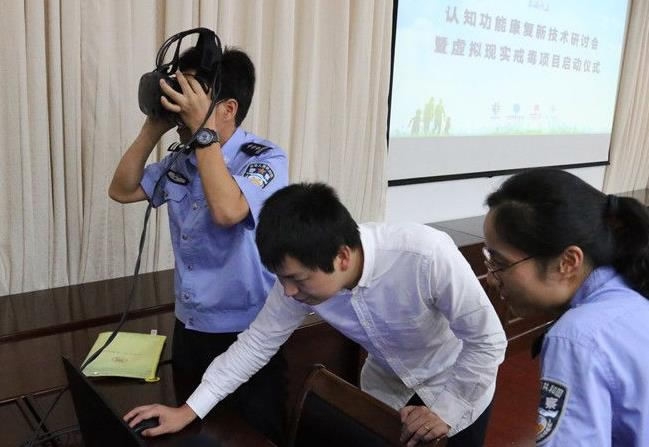
Health
19:57, 18-Oct-2017
In a first in China, Shanghai unveils VR drug rehabilitation system
By Wang Xueying

Drug rehabilitation centers in Shanghai have recently started using virtual reality technology to help addicts, a first in China, according to the Shanghai Drug Rehabilitation Administration.
Users wear a VR helmet with an eye-movement tracking system and then "walk into" simulated scenes with drugs, said the administration. Their eye movement, together with other biological indicators such as heart rate and skin conductivity, will be recorded as an objective way to show the patients’ degree of addiction.
At present, around 700 addicts in two of the city's five rehabilitation centers have been using the newly developed system since late September, said the administration. It could help staff members understand the addicts’ physiological condition and assist them to adjust the rehabilitation plans to different penitents.

Shanghai is the first to unveil VR drug rehabilitation system in China. /People's Daily Photo
Shanghai is the first to unveil VR drug rehabilitation system in China. /People's Daily Photo
The system was developed by the Shanghai Mental Health Center in cooperation with the School of Psychology and Cognitive Science of East China Normal University (ECNU) and Shanghai Qingtech, a company specializing in the technological tracking of eye control.
Zhao Min, deputy director of the center, said one key obstacle in abandoning drug habits is the difficulty for the staff and even the addicts to know how badly they are addicted.
"In the past, when addicts were asked whether they wanted narcotics, they usually said 'no' without exception, but it was not an honest answer, obviously," she said. "Now we can resort to the new system."

The system virtually simulates scenes with drugs. /Reuters Photo
The system virtually simulates scenes with drugs. /Reuters Photo
Besides, the new system can also provide addicts with a more efficient desensitization treatment to better prevent them from using drugs again.
"Patients are usually given desensitization treatment with pictures of narcotics in the rehabilitation centers, but such stimulation is less useful to truly arouse their appetite for drugs," Zhao said. "So after they leave the centers and are exposed to temptations, they might be submerged in drug abuse again."
More than 85 percent of those who abandon drug habits after two years of mandatory rehab will relapse within a year, according to statistics from the China's National Narcotics Control Commission.
Source(s): China Daily

SITEMAP
Copyright © 2018 CGTN. Beijing ICP prepared NO.16065310-3
Copyright © 2018 CGTN. Beijing ICP prepared NO.16065310-3